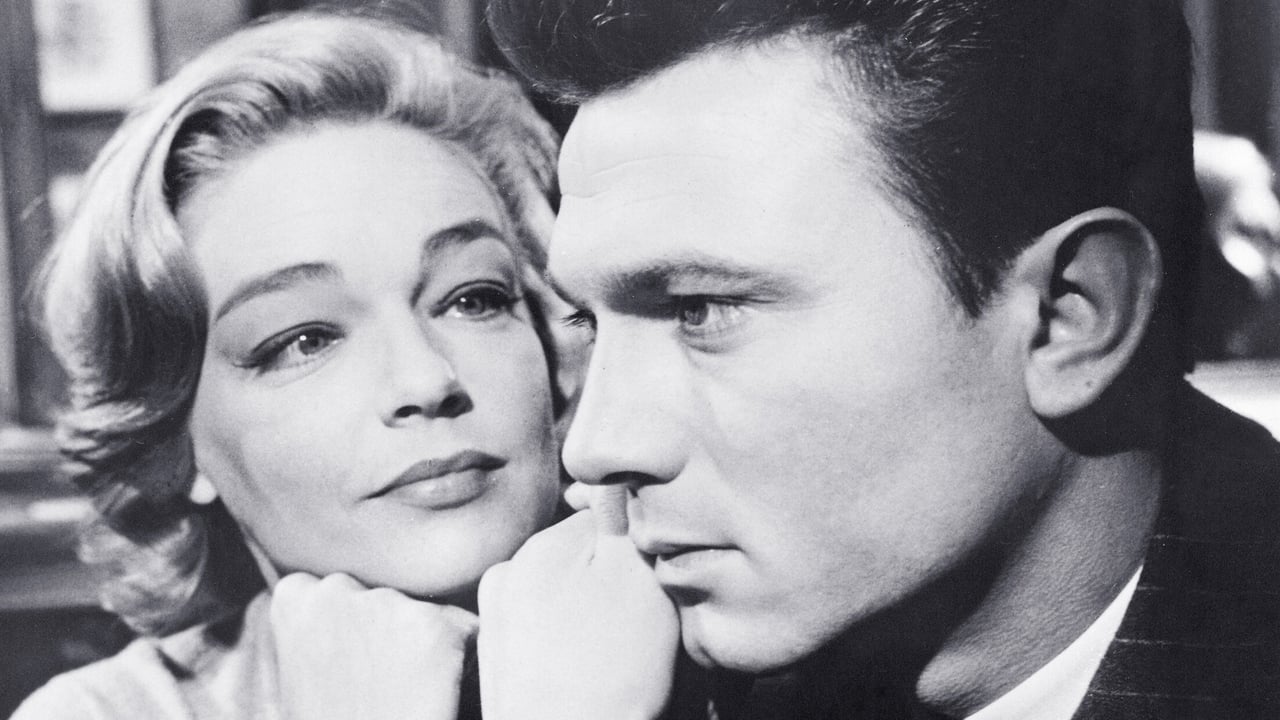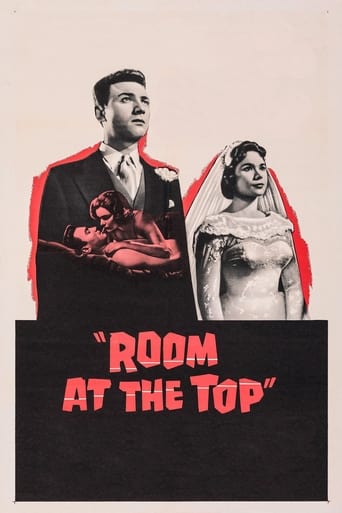Laikals
The greatest movie ever made..!
Ensofter
Overrated and overhyped
Ceticultsot
Beautiful, moving film.
ChampDavSlim
The acting is good, and the firecracker script has some excellent ideas.
atlasmb
A powerful performance by Laurence Harvey highlights this drama about a young man determined to be successful. Joe Lampton leaves the lower class industrial town of his youth with his sights set on achieving success on his own terms. His thin veneer of braggadocio hides layers of insecurity about his class and blue-collar pedigree.He determination to wed a naïve girl (Heather Sears)from money is sidetracked by his relationship with an older woman (Simone Signoret). Will his cold calculations determine his future or will he learn that life is about more than status and money?The strength of Harvey's portrayal borders on scenery chewing, but it is eminently watchable. Fortunately, Sears and Signoret are strong enough to balance his flamboyance, with the aid of Donald Wolfit who plays the father of the would-be bride with an understated power.Filmed in black and white, "Room at the Top" deserves its six Oscar nominations (and two wins). How much viewers enjoy it depends heavily upon their appreciation for Harvey's character, Joe Lampton.
kijii
This 'angry young man' film, based on John Blaine's novel, ranks as No. 32 on the BFI's Top 100. It was nominated for several Academy Awards including: Best Movie, Best Actor (Laurence Harvey), Best Actress (Simone Signoret), Best Supporting Actress (Hermione Baddeley), Best Director (Jack Clayton), and Best Screenplay (Neil Paterson). It won—and richly deserved--Oscars in the Best Actress and the Best Screenplay categories. Simone Signoret also won several other international awards for her role in his picture, a role that was originally offered to Vivian Leigh.The story is set in Yorkshire in the early 50s. After World War II, Joe Lampton leaves his depressed and bombed out town of Dufton to take up a job in Warnley. Both Dufton and Warnley are factory towns, but by moving to Warnley, Joe is able to take a secure job in the Borough Treasurer's Department. He is welcomed and shown the ropes by his fellow workers, like Charles Soames (Donald Houston). However, he immediately sets his goals higher when he sees the beautiful young and rich Susan Brown (Heather Sears). Though warned by both his co-workers and supervisor, that she is above his class and that her father, Mr. Brown (Donald Wolfit), practically 'owns' the town, his ambition is undaunted. When asked if it is her beauty or 'her brass' that he wants, he responds by asking, 'What's the matter with having both?' While being shown some of the town's activities, he gets involved with the local theater group when he finds out that Susan is part of the group. He introduces himself to her, but just as he is making a little headway with her, he is put in his place by Susan's super-obnoxious upper-class boyfriend, Jack Wales (John Westbrook). The hatred between the classes is immediately palpable as Joe almost visibly growls as Jack bests him at every turn of the conversation: even when comparing their military records in WW II, Jack has done everything Joe has, and more.In the theater group, he meets another slightly older French woman, Alice Aisgill (Simone Signoret). She is natural, self-confident, and easy to get to know. The two gradually become romantically involved in spite of the fact that she is separated from an abusive husband. When Joe meets Alice's friend, Elspeth (Hermione Baddeley), she tells him that Alice can be easily hurt and asks him not to hurt her. However, Joe continues to see Alice and pursue Susan at the same time. Realizing that Susan is in love with Joe, her father tries to separate them by sending her to the South of France and secretly manipulating a good job for Joe in his old town of Dufton. While visiting his home town —the town where he had lived as a boy and where his parents died during an 'off course' German air raid (which were almost always reserved for London)--Joe revisits some of his family and reflects upon his roots. However, seeing Mr. Brown's hand in this job offer, Joe refuses it and returns to Warnley and continues to see Alice, while waiting for Susan to return from France. When Susan and Joe meet again he seduces her into having sexual intercourse.When Mr. Brown later invites Joe to lunch with him at the Conservative Club, he offers to set Joe up in a full accounting partnership in another town if he will give up Susan. Joe refuses. As he starts to leave the Club, Mr. Brown tells him to marry Susan—immediately—and for obvious reasons. He also tells Joe that he will be set up in his company with a good position but that his relationship with 'that whore,' Alice Aisgill, must be cut off immediately and totally before plans for the wedding can continue. Joe insists on doing it personally rather than by phone or letter. When Joe goes to break it off with Alice, he finds out how totally in love she is with him as well as how proud she is that he has grown and matured beyond aspiring for the superficial nature of Susan and her money. Joe then tells Alice that they must break up because her husband would never give her a divorce. (Her husband had, in fact, threatened Joe with scandal if the two even attempted to go through with divorce proceedings.) When Alice realizes that her faith in Joe's change was wrong, she is totally broken. The crushing climax of the film brings the story totally into clear and brutal focus.--------------------------------------Director Jack Clayton uses the clever technique of having Joe hear of Alice's drunken and fatal auto crash at the same time as he is being cheered by the office crew for his promotion and upcoming marriage to Susan Brown. The overlapping office conversations of hearing both a joyful group congratulating him and the shocked gossip of Alice's mangled body, hits him at the same time, leaving him shocked and speechless.
ConDeuce
Jack Clayton directed a handful of movies (a total of 10) beginning in 1944 and ending in 1992. He's perhaps best known (if at all) for three: "The Pumpkin Eater", "The Innocents" and this film, "Room at the Top". It's remembered nowadays primarily (and justifiably) due to the extraordinarily rich, earthy performance of Simone Signoret."Room at the Top" was a critical and box office success due in part to what was (at the time) some fairly straight forward dialog about sex. Seen from the vantage point of 50 years later, much of that dialog is quaint and square. There are several films of this time period (like "Pillow Talk" and Jack Clayton's follow-up to "Room at the Top", his adaptation of Lawrence's "Sons and Lovers") that pushed the boundaries of accepted tastes and reaped box office success from it. One could argue that without it, these films would not have been successful. "Room at the Top" probably would have ended up in this category were it not for Simone Signoret. Signoret's performance feels full bodied, rich and real. She's the heart and soul of the film and she's years ahead of her time. She acts the way Glenda Jackson, Jane Fonda, Ellen Burstyn and Meryl Streep would act later on in the 70s. (It's astonishing to me that the Academy managed to recognize this and awarded her the Best Actress award in 1959. I suspect it helped that she spoke English as it is easier for a wider audience to easily understand and react to.) When the films pivotal tragedy strikes, it's impact is completely understandable because of her. The rest of the film is extremely well made but no other character in it has the depth and honest charm of Signoret. (SPOILER: My sole quibble is not with Signoret's performance but with her characters design. To me, it didn't make complete sense that a woman of such earthy charm and self knowledge would or could fall apart the way she does when Joe Lampton is forced to abandon her. In the scene where she tells Lampton about how she once posed nude for an artist, she comes across as a woman with an independent mind and spirit who (despite the heartbreak) could and would recover from such abandonment. Her "end" seems more of a contrived plot driver than a realist outcome.)
blanche-2
Laurence Harvey wants "Room at the Top" in this 1959 film also starring Simone Signoret and Heather Sears. Directed by Jack Clayton, the story concerns a young man, Joe Lampton (Harvey), sensitive about being from a low British class, who wants to marry the boss' daughter (Sears) for her money and position. She's part of a small amateur theater company, so he joins. There he meets an older woman, the unhappily married Alice Aisgill. The two drift into an affair and fall deeply in love. Two things stand in their way: Joe's ambition and Alice's brute of a husband.This is, to put it simply, a devastating story that will stay with you long after the film is over. The movie belongs to Signoret, so sexy, so beautiful, so sad - she's perfect. Her vulnerability, her frankness, her coolness, and her deep unhappiness will shatter you. She deserved her Oscar hands-down.Harvey is magnificent as Joe. He's handsome, sexy, greedy, bitter, evil, and utterly determined to punish the upper class because he was born poor. The last scene is a knockout. I haven't seen the sequel - I can only imagine! Heather Sears does an excellent job as the whiny object of his affections, and Hermoine Baddeley, as Alice's friend, gives a marvelous performance. She was not only a top bawdy comedienne but a brilliant actress.Signoret was one of the great film presences, and if you see Room at the Top for no other reason, see it for her. The entire film is a knockout.

